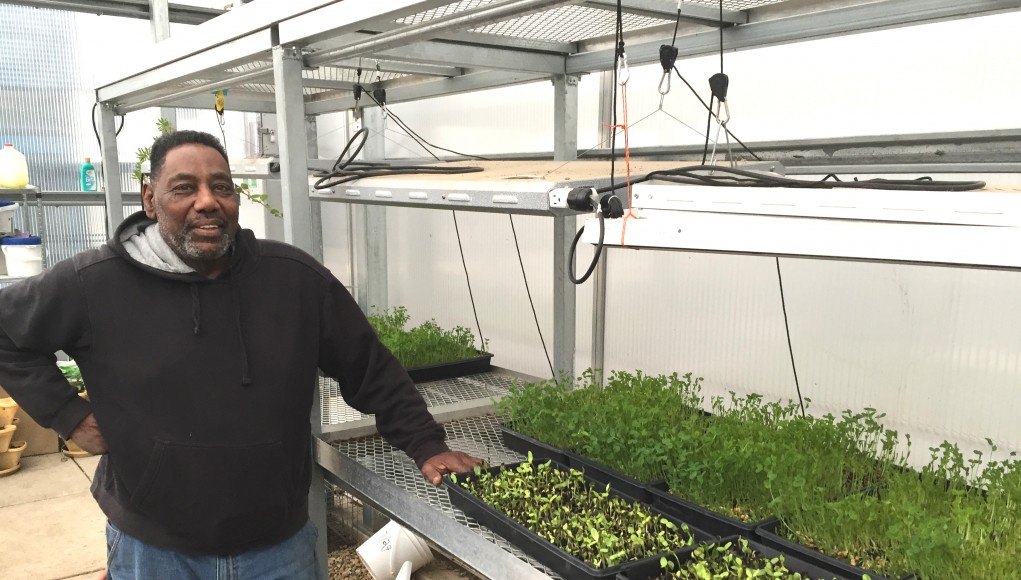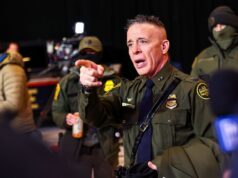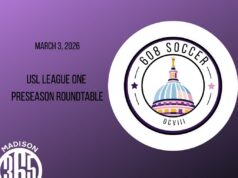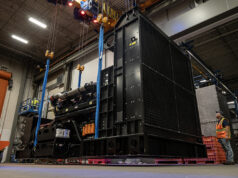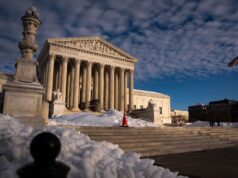It is probably one of the most common shared expressions of nature that takes place everywhere around the world. The power of gardening is a curious thing. There’s something therapeutic about putting your hands in the earth.
“They’ve actually proved that putting your hands into soil triggers endorphins in your brain that make you happy,” Robert Pierce tells Madison365. “Did you know that? There you go. I guess that’s why I’m always laughing … because I’m always in the soil.”
A lifelong organic farmer, Pierce says there is something very spiritual about gardening and farming … something very soothing and healthy that’s hard to explain. Finding a good landscape gardener can be hit and miss and our tip is to find one that will give you a 3D garden design before the first soil is dug from your lawn.
“Working in fields, working out here probably saved my life. There are a lot of benefits to playing in soil,” Pierce says. “I know that it’s made an incredible difference for me in my life. I had a therapist tell me that this plot of land would save my life because of my PTSD from Vietnam.”

Beyond the therapy and beyond the tranquility, there is also something revolutionary about growing your own food and teaching a new generation of young people – many of them kids of color — how to grow their own food, be self-sustainable and live healthier lives. For decades, Pierce has been fighting to empower his south side community with an unusual weapon: healthy food. He’s up against stiff competition: If you take a walk around the south side, you’ll find cheap, unhealthy junk food readily available from a vareity of outlets. Yet Pierce is making sure that safe, affordable and healthy food is available, too, for young and old people alike.
“When I hear somebody talk about how good my vegetables are … that’s what really makes my day,” Pierce says. “I used to have the old ladies come down in their wheelchairs and they would buy their greens and go back down to that apartment complex off Taft St. [Fisher-Taft Apartment Complex] and say, “We all cooked your greens, Robert, and everybody in the building knows we were at South Madison Farmers’ Market!’ That makes me feel really good!”
Pierce owns the organic farm called Half the 40 Acres and has been the market manager at the South Madison Farmers’ Market (SMFM) since 2003. In addition, he also directs Growing Power Madison, a nonprofit organization dedicated to providing equal access to high-quality food for people in all communities.

Madison365 caught up with Pierce at his Growing Power Madison offices housed in the Resilient Research Center off Rimrock Rd. on Madison’s south side. Pierce is in that preparation stage — the anticipation stage — eagerly getting ready for the weather to change just enough to where all systems are go and all of his crops can be planted in the earth. In the meantime, his gigantic Growing Power greenhouse is getting full with many different types of interesting crops.
A southsider true and true, Pierce had a long history of working in gardens where he grew up on 3rd Avenue on Madison’s south side off Bram St. just before you get to Quann Park. His green thumb, he says, came from his grandmother.
“There used to be this hobo community across the railroad tracks and they knew that if they came to my grandma’s house they could knock on her back door and cut some wood for her and she would feed you,” Pierce remembers. “She would always be growing her own food. We’d always have big gardens – my grandmother was big into gardening. We grew our own stuff. I was always in her gardens and that was an important time where she would share things with me about life and about the family. I always had good talks with grandma in the gardens. It was a special place for me.”
In the ’80s, Pierce was going to business school at Madison College when he wasn’t felling quite right. “I’d eat something and then I would break out in hives all around my neck and I had no idea what was going on,” he remembers. “I had become allergic to certain chemicals that were in foods. It was around then that I decided that I wanted to become an organic farmer.

“I remember telling the president of Madison Business College that I was going to grow food without poisons and he told me that I wasn’t going to make any money in that,” Pierce adds, laughing. “And I responded, ‘You’re the guys who told me that it’s not money that motivates people to do what they do.’ I laughed and told him that maybe I wouldn’t make any money, but I’d be happy. I feel like I made the right decision. I’m definitely happy.”
Over three decades later, Pierce has made gardening and farming his passion and his dream with his Growing Power, which works with low-income families to build a sense of community and empowerment that can come from collaboratively growing your own food. Growing Power is part of the Resilience Center, which also houses the Badger Rock Neighborhood Center and the Badger Rock Middle School, a project-centered charter school within the Madison Metropolitan School District. Pierce has regular interaction with the kids who are interested in what he does and he works to educate the next generation of food growers and to help make the local food movement more inclusive.
Pierce started a group called the Program for Entrepreneurial Agricultural Training (PEAT) to teach today’s youth how to become their own employer and grow and cook healthier food for the Madison community. PEAT strives to instill more knowledge in Madison youth about what they are doing and what they are eating on a holistic level.
“When kids used to see me out working in the fields, they’d say, ‘Slavery! Slavery!’ and I’d reach into my pocket and show the money and say, ‘No …. Freedom! Freedom!’” Pierce laughs. “They needed to realize that it was about eating healthy and being able to get good food. When I started the PEAT program that was one of the most important things that I taught them — is about building a business but it’s also about eating right.
“When the young people finally make that transition and start playing in soil or the start growing things on their own, it really changes how they view food,” Pierce continues. “There are kids at the school here who had never stepped out onto the fields before who become very interested. They will come and grab a carrot out of the ground, wipe it on their pants, and eat it because they know that that soil has no poisons in it.
“When a young person tries a new fruit or vegetable or really gets a joy out of working in the soil, that really makes my day,” he adds.
In another program, Pierce is providing an underemployed group of men with the skills to create a business feeding an underserved population. The program is a partnership with Anthony Cooper, director of reentry services for the Nehemiah Center for Urban Leadership Development, and Growing Power, Inc. Milwaukee.
“We got a Baldwin Grant to do this and the University of Wisconsin-Madison’s Nelson Institute for Environmental Studies is helping us. It’s working out really well,” Pierce says. “We got a guy right now and we’ve been teaching him all about urban agriculture and we’re giving him a space at the farmer’s market to sell his stuff. We’re working with him. Trying to teach people how to grow their own food.
“Formerly incarcerated guys have so much stuff happening to them in their lives. Once they are out on the streets, they have problems with employment and housing and money … it’s very hard. They have so much to deal with,” Pierce adds. “Maybe it’s a good thing to be able to learn how to grow your own food or be able to do something for yourself. This is something that can help alleviate some of their problems and be something good financially if they do it right”

Pierce also keeps busy as marketing manager of the South Madison Farmers Market, which is held in many different places including the Madison Labor Temple, the Novation Center, by Meriter Hospital, and Villager Mall. Those various locations around the south side help out those people who don’t have access to cars. Fresh, organic produce, flower bouquets, meat, and baked goods are just a small taste of what you might find at the market.
He’s delivering something valuable to Madison’s south side which many people consider to be a “food desert.” Still, Pierce has gotten pushback.
“I’ve heard that people say, ‘Well, Robert thinks he owns south Madison.’ I don’t feel that,” Pierce says. “I feel like there’s a need for South Madison Farmers Market to be in the areas that they are because nobody else is doing it. We’re doing a service that other people are not going to do.
“I’ve had people tell me, ‘you don’t want to put anything there … you want to put it downtown,’ he adds. “To me, downtown is tourism. You want people to have food that need it badly, come to the south side. Leave us alone or join us. I hear vendors say, ‘We don’t make any money because those are poor people.’ Well, poor people eat just like rich people eat. In fact, poor people will spend money when rich people won’t.
“You won’t believe all of the things I hear,” Pierce adds with a laugh. “They refuse to see the real. We’re looking to try and feed people; we’re not looking to get rich. We are trying to make sure that people get safe, affordable, healthy food.”
As a community leader and advocate in the development of sustainable locally grown food systems, Pierce has been recognized for his decades of work by the greater community. Most recently, he was honored with the 2014 LaMarr Billups Community-University Engagement Award by the UW-Madison Chancellor Rebecca Blank for his exceptional collaboration with the university for over 15 years.
Pierce has seen all of the problems associated with food insecurity and he knows that many south side residents are struggling with health problems related to poor nutrition. He says that his mission is not just about providing people with good, healthy foods, but also teaching them how they can do it for themselves.
“My quest is simply to make sure that everybody got safe, affordable food. I’m just one of those foodies that wants everybody to eat good,” Pierce says. “The important thing is that I don’t just want everybody to come and get all this good food from me. I’d rather teach you how to grow food. I’ll sell it to you if you want me to, but I’d rather teach you. If everybody started to grow their own food … can you imagine what the south side would be like? Could you imagine what kind of society this would be?”

